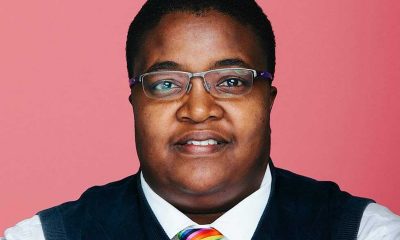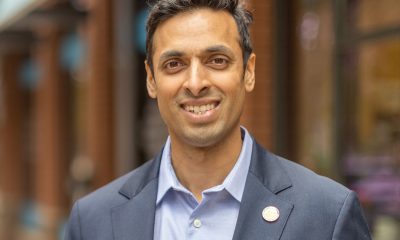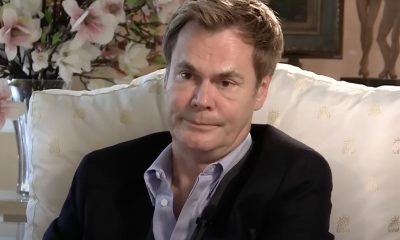News
Obama includes gay rights in Mandela speech
President says people are still persecuted for ‘who they love’ around the world

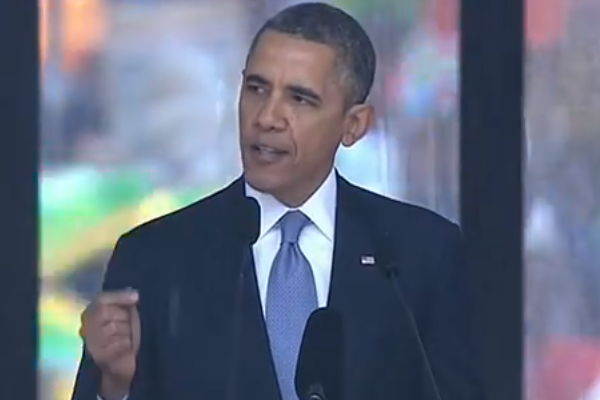
President Obama delivers a speech on Nelson Mandela in a memorial service in South Africa (Screenshot courtesy YouTube).
President Obama made a veiled reference to the struggle for gay rights across the world in his speech at the memorial service in South Africa honoring the life of the Nelson Mandela.
Obama made the reference to gay rights — saying people around the world are still persecuted for “who they love” — when making a generalized statement about the struggle for equality in which Mandela led the way in South Africa.
“The struggles that follow the victory of formal equality or universal franchise may not be as filled with drama and moral clarity as those that came before, but they are no less important,” Obama said. “For around the world today, we still see children suffering from hunger and disease. We still see run-down schools. We still see young people without prospects for the future. Around the world today, men and women are still imprisoned for their political beliefs, and are still persecuted for what they look like, and how they worship, and who they love. That is happening today.”
In remarks delivered at First National Bank Stadium on a rainy day in Johannesburg, South Africa, Obama commemorated Nelson, who worked to end apartheid in the country. After being imprisoned for 27 years, Nelson entered negotiations to achieve that goal and became the first South African elected in a fully representative democratic election.
In his 15-minute speech, Obama said Mandela served as an inspiration in part because his willingness to admit imperfection encouraged others to make similar endeavors in pursuit of equality.
“For nothing he achieved was inevitable,” Obama said. “In the arc of his life, we see a man who earned his place in history through struggle and shrewdness, and persistence and faith. He tells us what is possible not just in the pages of history books, but in our own lives as well.”
According to a pool report, Obama received a big roar from the crowd when he concluded his remarks. In addition to shouting and applause, the sound of the horn made famous during the World Cup, the Vuvuzela, filled the stadium. As Obama walked away from the stage, people rushed through the stands to see him.
Upon the news of his death, LGBT rights advocates praised the legacy of Mandela, saying he helped inspire them to achieve equality for LGBT people. Under the leadership of Mandela, South Africa became the first country in the world to add a ban on discrimination based on sexual orientation into its constitution.
Also in attendance for the memorial service were first lady Michelle Obama, former President George W. Bush, former President Bill Clinton and former Secretary of State Hillary Clinton. President Obama made headlines by shaking the hand of Cuban President Raul Castro, who also in the audience.
Read Obama’s full remarks as provided by the White House here:
THE WHITE HOUSE
Office of the Press Secretary
December 10, 2013
REMARKS BY PRESIDENT OBAMA
AT MEMORIAL SERVICE FOR FORMER SOUTH AFRICAN
PRESIDENT NELSON MANDELA
First National Bank Stadium
Johannesburg, South Africa
1:31 P.M. SAST
PRESIDENT OBAMA: Thank you. (Applause.) Thank you so much. Thank you. To Graça Machel and the Mandela family; to President Zuma and members of the government; to heads of states and government, past and present; distinguished guests — it is a singular honor to be with you today, to celebrate a life like no other. To the people of South Africa — (applause) — people of every race and walk of life — the world thanks you for sharing Nelson Mandela with us. His struggle was your struggle. His triumph was your triumph. Your dignity and your hope found expression in his life. And your freedom, your democracy is his cherished legacy.
It is hard to eulogize any man — to capture in words not just the facts and the dates that make a life, but the essential truth of a person — their private joys and sorrows; the quiet moments and unique qualities that illuminate someone’s soul. How much harder to do so for a giant of history, who moved a nation toward justice, and in the process moved billions around the world.
Born during World War I, far from the corridors of power, a boy raised herding cattle and tutored by the elders of his Thembu tribe, Madiba would emerge as the last great liberator of the 20th century. Like Gandhi, he would lead a resistance movement — a movement that at its start had little prospect for success. Like Dr. King, he would give potent voice to the claims of the oppressed and the moral necessity of racial justice. He would endure a brutal imprisonment that began in the time of Kennedy and Khrushchev, and reached the final days of the Cold War. Emerging from prison, without the force of arms, he would — like Abraham Lincoln — hold his country together when it threatened to break apart. And like America’s Founding Fathers, he would erect a constitutional order to preserve freedom for future generations — a commitment to democracy and rule of law ratified not only by his election, but by his willingness to step down from power after only one term.
Given the sweep of his life, the scope of his accomplishments, the adoration that he so rightly earned, it’s tempting I think to remember Nelson Mandela as an icon, smiling and serene, detached from the tawdry affairs of lesser men. But Madiba himself strongly resisted such a lifeless portrait. (Applause.) Instead, Madiba insisted on sharing with us his doubts and his fears; his miscalculations along with his victories. “I am not a saint,” he said, “unless you think of a saint as a sinner who keeps on trying.”
It was precisely because he could admit to imperfection — because he could be so full of good humor, even mischief, despite the heavy burdens he carried — that we loved him so. He was not a bust made of marble; he was a man of flesh and blood — a son and a husband, a father and a friend. And that’s why we learned so much from him, and that’s why we can learn from him still. For nothing he achieved was inevitable. In the arc of his life, we see a man who earned his place in history through struggle and shrewdness, and persistence and faith. He tells us what is possible not just in the pages of history books, but in our own lives as well.
Mandela showed us the power of action; of taking risks on behalf of our ideals. Perhaps Madiba was right that he inherited, “a proud rebelliousness, a stubborn sense of fairness” from his father. And we know he shared with millions of black and colored South Africans the anger born of, “a thousand slights, a thousand indignities, a thousand unremembered moments…a desire to fight the system that imprisoned my people,” he said.
But like other early giants of the ANC — the Sisulus and Tambos — Madiba disciplined his anger and channeled his desire to fight into organization, and platforms, and strategies for action, so men and women could stand up for their God-given dignity. Moreover, he accepted the consequences of his actions, knowing that standing up to powerful interests and injustice carries a price. “I have fought against white domination and I have fought against black domination. I’ve cherished the ideal of a democratic and free society in which all persons live together in harmony and [with] equal opportunities. It is an ideal which I hope to live for and to achieve. But if needs be, it is an ideal for which I am prepared to die.” (Applause.)
Mandela taught us the power of action, but he also taught us the power of ideas; the importance of reason and arguments; the need to study not only those who you agree with, but also those who you don’t agree with. He understood that ideas cannot be contained by prison walls, or extinguished by a sniper’s bullet. He turned his trial into an indictment of apartheid because of his eloquence and his passion, but also because of his training as an advocate. He used decades in prison to sharpen his arguments, but also to spread his thirst for knowledge to others in the movement. And he learned the language and the customs of his oppressor so that one day he might better convey to them how their own freedom depend upon his. (Applause.)
Mandela demonstrated that action and ideas are not enough. No matter how right, they must be chiseled into law and institutions. He was practical, testing his beliefs against the hard surface of circumstance and history. On core principles he was unyielding, which is why he could rebuff offers of unconditional release, reminding the Apartheid regime that “prisoners cannot enter into contracts.”
But as he showed in painstaking negotiations to transfer power and draft new laws, he was not afraid to compromise for the sake of a larger goal. And because he was not only a leader of a movement but a skillful politician, the Constitution that emerged was worthy of this multiracial democracy, true to his vision of laws that protect minority as well as majority rights, and the precious freedoms of every South African.
And finally, Mandela understood the ties that bind the human spirit. There is a word in South Africa — Ubuntu — (applause) — a word that captures Mandela’s greatest gift: his recognition that we are all bound together in ways that are invisible to the eye; that there is a oneness to humanity; that we achieve ourselves by sharing ourselves with others, and caring for those around us.
We can never know how much of this sense was innate in him, or how much was shaped in a dark and solitary cell. But we remember the gestures, large and small — introducing his jailers as honored guests at his inauguration; taking a pitch in a Springbok uniform; turning his family’s heartbreak into a call to confront HIV/AIDS — that revealed the depth of his empathy and his understanding. He not only embodied Ubuntu, he taught millions to find that truth within themselves.
It took a man like Madiba to free not just the prisoner, but the jailer as well — (applause) — to show that you must trust others so that they may trust you; to teach that reconciliation is not a matter of ignoring a cruel past, but a means of confronting it with inclusion and generosity and truth. He changed laws, but he also changed hearts.
For the people of South Africa, for those he inspired around the globe, Madiba’s passing is rightly a time of mourning, and a time to celebrate a heroic life. But I believe it should also prompt in each of us a time for self-reflection. With honesty, regardless of our station or our circumstance, we must ask: How well have I applied his lessons in my own life? It’s a question I ask myself, as a man and as a President.
We know that, like South Africa, the United States had to overcome centuries of racial subjugation. As was true here, it took sacrifice — the sacrifice of countless people, known and unknown, to see the dawn of a new day. Michelle and I are beneficiaries of that struggle. (Applause.) But in America, and in South Africa, and in countries all around the globe, we cannot allow our progress to cloud the fact that our work is not yet done.
The struggles that follow the victory of formal equality or universal franchise may not be as filled with drama and moral clarity as those that came before, but they are no less important. For around the world today, we still see children suffering from hunger and disease. We still see run-down schools. We still see young people without prospects for the future. Around the world today, men and women are still imprisoned for their political beliefs, and are still persecuted for what they look like, and how they worship, and who they love. That is happening today. (Applause.)
And so we, too, must act on behalf of justice. We, too, must act on behalf of peace. There are too many people who happily embrace Madiba’s legacy of racial reconciliation, but passionately resist even modest reforms that would challenge chronic poverty and growing inequality. There are too many leaders who claim solidarity with Madiba’s struggle for freedom, but do not tolerate dissent from their own people. (Applause.) And there are too many of us on the sidelines, comfortable in complacency or cynicism when our voices must be heard.
The questions we face today — how to promote equality and justice; how to uphold freedom and human rights; how to end conflict and sectarian war — these things do not have easy answers. But there were no easy answers in front of that child born in World War I. Nelson Mandela reminds us that it always seems impossible until it is done. South Africa shows that is true. South Africa shows we can change, that we can choose a world defined not by our differences, but by our common hopes. We can choose a world defined not by conflict, but by peace and justice and opportunity.
We will never see the likes of Nelson Mandela again. But let me say to the young people of Africa and the young people around the world — you, too, can make his life’s work your own. Over 30 years ago, while still a student, I learned of Nelson Mandela and the struggles taking place in this beautiful land, and it stirred something in me. It woke me up to my responsibilities to others and to myself, and it set me on an improbable journey that finds me here today. And while I will always fall short of Madiba’s example, he makes me want to be a better man. (Applause.) He speaks to what’s best inside us.
After this great liberator is laid to rest, and when we have returned to our cities and villages and rejoined our daily routines, let us search for his strength. Let us search for his largeness of spirit somewhere inside of ourselves. And when the night grows dark, when injustice weighs heavy on our hearts, when our best-laid plans seem beyond our reach, let us think of Madiba and the words that brought him comfort within the four walls of his cell: “It matters not how strait the gate, how charged with punishments the scroll, I am the master of my fate: I am the captain of my soul.”
What a magnificent soul it was. We will miss him deeply. May God bless the memory of Nelson Mandela. May God bless the people of South Africa. (Applause.)
END 1:50 P.M. SAST
Politics
HRC slams White House over position opposing gender affirming surgeries for minors
‘Biden administration is flat wrong on this’
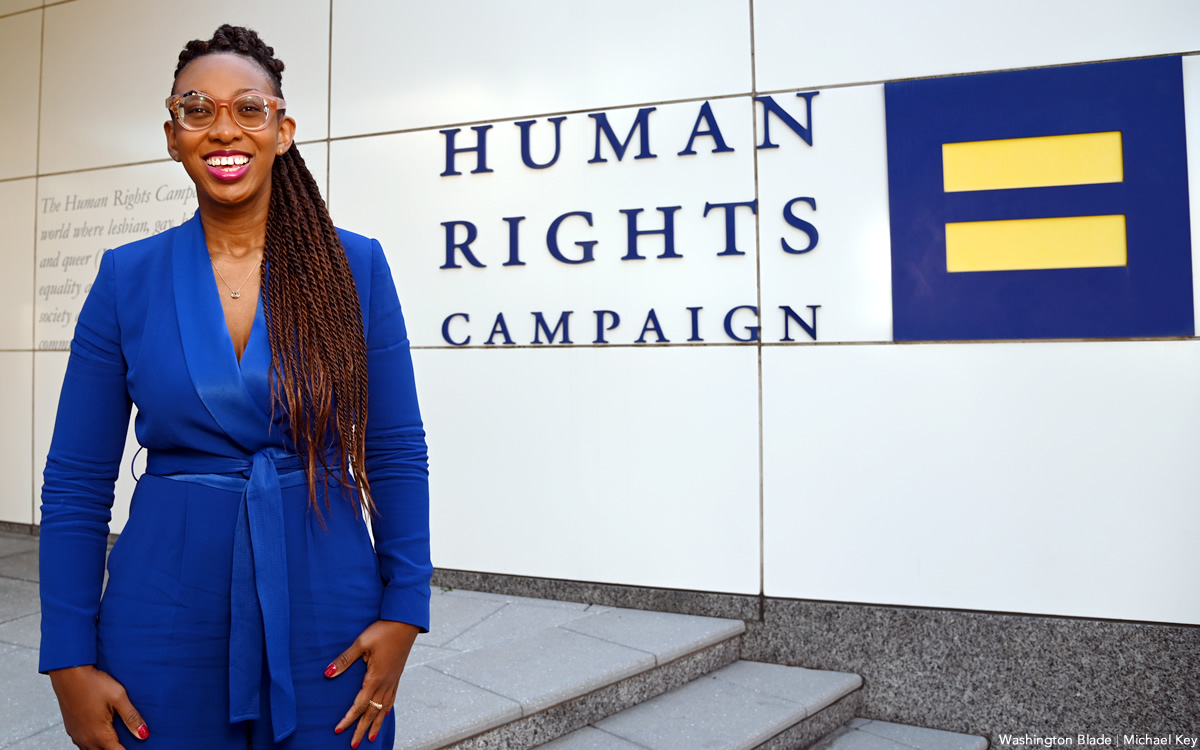
Human Rights Campaign President Kelley Robinson issued a strong rebuke on Tuesday of the Biden-Harris administration’s position opposing gender affirming surgeries for minors.
The New York Times reported on June 28 that the White House, which broadly supports making medical interventions available for transgender youth, had expressed opposition to surgeries for patients under 18, having previously declined to take a specific position on the question.
“Health care decisions for young people belong between a patient, their family, and their health care provider. Trans youth are no exception,” Robinson responded.
“The Biden administration is flat wrong on this. It’s wrong on the science and wrong on the substance. It’s also inconsistent with other steps the administration has taken to support transgender youth. The Biden administration, and every elected official, need to leave these decisions to families, doctors and patients—where they belong,” she added. “Although transgender young people make up an extremely small percentage of youth in this country, the care they receive is based on decades of clinical research and is backed by every major medical association in the U.S. representing over 1.3 million doctors.”
Robinson said the “administration has committed to fight any ban on healthcare for transgender youth and must continue this without hesitation—the entire community is watching.”
“No parent should ever be put in the position where they and their doctor agree on one course of action, supported by the overwhelming majority of medical experts, but the government forbids it,” she added.
HRC is a prominent backer of Biden’s 2024 reelection campaign, having pledged $15 million to support efforts in six battleground states. The organization has a strong relationship with the White House, with the president and first lady headlining last year’s National Dinner.
A White House spokesperson declined to respond to Robinson’s statement.
Campaign for Southern Equality President Allison Scott also issued a statement.
“This is a cowardly statement from an administration that promised to support transgender people. It is a troubling concession to the right-wing assault on transgender Americans, falling for their false narratives about surgical care and betraying a commitment to equality and trust in the medical community,” said Scott.
“Let’s be very, very clear: Government has no business inserting itself into private medical decisions that should be exclusively between patients, their providers, and the patients’ parent or guardian,” Scott added.
“It is dangerous to begin endorsing categorical bans or limits on healthcare, and there is no justification for restricting transgender youth’s access to the very same care that many cisgender youth receive every year — that’s literally the definition of discrimination,” Scott concluded. “We demand the Biden administration retract this thoughtless statement and work to undo its damage.”
Virginia
Parades, community events held to mark Pride Month in Va.
Upwards of 30,000 people attended PrideFest in Norfolk on June 22

Activists across Virginia last month held a series of events to mark Pride Month.
Hampton Roads Pride, a volunteer-run organization founded in 1997, held 37 different Pride events throughout the region in June.
Their biggest event, PrideFest, which is part of their larger three day event, Pride Weekend, celebrated its 36th anniversary on June 22. Pride Weekend took place from June 21-23 and began with a block party at NorVa in Norfolk.
PrideFest took place at Town Point Park, and an estimated 30,000 people attended. More than 70 venders participated, while Todrick Hall and Mariah Counts are among those who performed.
Another PrideFest event with a DJ in the afternoon and live music at night took place in Virginia Beach on June 23. Congressman Bobby Scott and U.S. Sen. Tim Kaine (D-Va.) are among those who attended Pride events in Suffolk on June 30.
Norfolk Mayor Kenneth Alexander, along with members of the Norfolk and Virginia Beach City Councils, also attended the Pride events in their respective cities. Jamar Walker, the first openly gay federal judge in Virginia, also took part.
“You know people all throughout Pride Month, at all of our various events, tell me all kinds of stories about their own experiences and the past of this community … and some of our older folks especially, remember when we couldn’t have this,” Hampton Roads Pride President Jeff Ryder told the Washington Blade on Monday during a telephone interview.
“It was a great year,” he added. “It was a big achievement for us to have unique celebrations in each of our seven communities. Each of these cities is so different from one another, but to be able to create a Pride celebration that’s unique in each of those places was really great, and I think really well received by folks who may not have felt represented previously. We’re always trying to do better, to embrace every aspect of our community, and take a big step forward there this year.”
State Dels. Adele McClure (D-Arlington County) and Alfonso Lopez (D-Arlington County) are among those who spoke at Arlington Pride that took place at Long Bridge Park on June 29. The Fredericksburg Pride march and festival took place the same day at Riverfront Park in Fredericksburg.
Republican Virginia Gov. Glenn Youngkin on June 10 hosted a Pride Month reception in Richmond.
Youngkin in previous years has hosted Pride Month receptions, even though Equality Virginia and other advocacy groups have criticized him for supporting anti-LGBTQ bills.
The Republican governor in March signed a bill that codified marriage equality in Virginia. Youngkin last month vetoed a measure that would have expanded the definition of bullying in the state.
U.S. Supreme Court
Concern over marriage equality in US grows two decades after first Mass. same-sex weddings
Gay and lesbian couples began to marry in Bay State in 2004

Two decades after Massachusetts became the first state to legalize same-sex marriage, a new study reveals both significant progress and ongoing challenges for married LGBTQ couples in the U.S., with a growing sense of insecurity about the future of their rights.
The Williams Institute at UCLA School of Law surveyed 484 married same-sex couples from all 50 states and D.C. The study, released Monday, marks the 20th anniversary of legal same-sex marriage in the U.S.
Researchers found that 93 percent of respondents cited love as a primary reason for marrying, with 75 percent also mentioning legal protections. Over 83 percent reported positive changes in their sense of security, and 74.6 percent noted improved life satisfaction since marrying.
However, the study also highlighted persistent discrimination and growing concerns about the future. About 11 percent of couples who had a wedding reported facing prejudice during the planning process.
Alarmingly, nearly 80 percent of respondents expressed concern about the potential overturning of the 2015 Obergefell v. Hodges decision, which legalized same-sex marriage nationwide. This anxiety has been exacerbated by initiatives like Project 2025, a conservative policy blueprint that some fear could roll back LGBTQ rights if implemented.
The possibility of a former President Donald Trump victory in the upcoming election has further intensified these concerns. Many respondents cited Trump’s previous U.S. Supreme Court appointments and his statements on LGBTQ issues as reasons for their apprehension. One participant stated, “The thought of another Trump presidency keeps me up at night. We’ve come so far, but it feels like our rights could be stripped away at any moment.”
The current political climate has 29 percent of respondents considering moving to another state, with 52.9 percent citing socio-political concerns as a primary reason. This reflects a growing sense of insecurity among LGBTQ couples about their rights and freedoms.
Brad Sears, founding executive director of the Williams Institute, noted, “The data clearly show that marriage equality has had a profound positive impact on same-sex couples and their families. However, it also reveals ongoing challenges and serious concerns about the future of these rights in light of current political trends and the upcoming election.”
Christy Mallory, legal director at the Williams Institute and lead author of the study, added, “This research provides crucial insights into the lived experiences of same-sex couples two decades after marriage equality began in the U.S. The high level of concern about potential loss of rights underscores the continued importance of legal protections and public support for LGBTQ+ equality.”
The study found that 30 percent of surveyed couples have children, with 58.1 percent of those parents reporting that marriage provided more stability for their families. However, many of these families now worry about the security of their legal status in the face of potential policy changes and shifting political landscapes.
As the nation reflects on two decades of marriage equality, the study underscores both the transformative power of legal recognition and the ongoing need for vigilance in protecting LGBTQ+ rights. The findings highlight the complex reality faced by same-sex couples in America today: Celebrating hard-won progress while grappling with uncertainty about the future, particularly in light of upcoming political events and potential shifts in leadership.
-

 Canada1 day ago
Canada1 day agoToronto Pride parade cancelled after pro-Palestinian protesters disrupt it
-

 Theater5 days ago
Theater5 days agoStephen Mark Lukas makes sublime turn in ‘Funny Girl’
-

 Baltimore4 days ago
Baltimore4 days agoDespite record crowds, Baltimore Pride’s LGBTQ critics say organizers dropped the ball
-

 Sports4 days ago
Sports4 days agoHaters troll official Olympics Instagram for celebrating gay athlete and boyfriend

